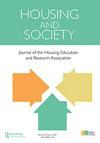流行病的不稳定性和日常差距:北美的性别住房需求
Q2 Social Sciences
引用次数: 8
摘要
我们为在美国和加拿大工作的住房研究人员、从业人员和倡导者确定了在COVID-19大流行期间和以后要考虑的关键问题。首先,我们借鉴了关于性别不平等和社会结构的女权主义和交叉文献,这些文献为女性在住房中的经历提供了经常被遗忘或忽视的背景。这包括一个更广泛的认识,即妇女往往没有参与制定住房政策和规划环境,尽管她们受到这些政策和规划环境的不成比例的影响。其次,我们描述了女性与住房相关的不稳定性及其一些影响,将这项研究建立在对住房和资源分配方式的政治经济学批评以及重视利润而不是人的新自由主义气候的基础上,这种气候导致了许多社区中许多女性的不稳定。最后,我们提供了一些组织和倡议的例子,这些组织和倡议致力于解决本文确定的差异。在整篇论文中,我们强调需要交叉和跨学科的合作(例如,酷儿、反种族主义、女权主义者、政治经济学和其他学者之间的合作),这些合作涉及复杂性,并以公平和正义为导向。本文章由计算机程序翻译,如有差异,请以英文原文为准。
Pandemic precarity and everyday disparity: gendered housing needs in North America
ABSTRACT We identify key issues for housing researchers, practitioners, and advocates working in the United States and Canada to consider, both during the COVID-19 pandemic and far beyond. First, we draw upon feminist and intersectional literatures on gendered inequalities and social structures, which provide the often forgotten or overlooked context for women’s experiences in housing. This includes the broader insight that too frequently, women have not been involved in shaping the policy and planning climate around housing, even as they disproportionately are affected by them. Second, we describe women’s housing-related precarity and some of its implications, grounding this research in a political economic critique of the way that housing and resources are allocated and the neoliberal climate that values profit over people and that has induced instability for many women in so many communities. We conclude by offering examples of organizations and initiatives that work to address the disparities identified herein. Throughout the paper, we emphasize the need for intersectional and interdisciplinary collaborations (for example, among queer, anti-racist, feminist, political economic, and other scholars) that engage with complexity and orient toward equity and justice.
求助全文
通过发布文献求助,成功后即可免费获取论文全文。
去求助
来源期刊

Housing and Society
Social Sciences-Urban Studies
CiteScore
2.30
自引率
0.00%
发文量
10
期刊介绍:
Housing and Society is the journal of the Housing Education and Research Association (HERA). The journal supports the mission of HERA by providing for the dissemination of research and other scholarly work. Submissions from a broad range of perspectives are encouraged. Topics in housing include: policy, design, social aspects, gerontology, behavioral aspects, energy/environment, equipment, interiors, economics, theory/model development, education, and program development or evaluation. The journal welcomes the submission of original research articles, notes and commentaries. Notes are shorter manuscripts presenting succinct information on housing related to one of the following categories: - Research: exploratory or not heavily theory-based or statistically analyzed - Academic: innovative teaching ideas - Program: development, implementation, and/or evaluation of Cooperative Extension or other housing programming efforts - Policy: examination of policy impact, comparative analysis, and/or need to achieve housing goals - Reviews: books, documentaries, etc.
 求助内容:
求助内容: 应助结果提醒方式:
应助结果提醒方式:


